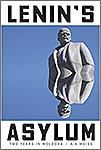Review — LENIN’S ASYLUM: Two Years in Moldova by A.A.Weiss
 Lenin’s Asylum: Two Years in Moldova
Lenin’s Asylum: Two Years in Moldova
by A.A. Weiss (Moldova 2006-08)
Everytime Press
255 pages
June 2018
$6.00 (Kindle); $16.95 (Paperback)
Reviewed by Steve Kaffen (Russia 1994-96)
•
Lenin’s Asylum; Two Years in Moldova by A.A. Weiss (Moldova 2006-08) is superb writing: flowing and fast-paced, insightful, entertaining, humorous, and empathetic. It describes the author’s two years as a Peace Corps volunteer teaching English in a village in Moldova. A.A. Weiss is a gifted storyteller and uses crisp sentences, vivid descriptions, and abundant dialogue that are lively, revealing, and often funny. The writing is very personal; you feel the author’s frustrations and joys.
Moldova is perhaps the most forgotten country of the former Soviet republics, a landlocked place sandwiched between Russia, Romania, and Ukraine. Moldova clings to Russian, Romanian, or Ukrainian language, culture, and traditions depending upon the region. Of note, the author remarks several times that he was appropriately trained in Russian, while prior volunteers in his village were taught little-used Romanian.
It’s a difficult environment to live and work in, and the author’s group contracts from 37 to 22 during his two years of service. Notably, the challenges of life and work strengthen many volunteers’ resolve. Asked by the author “You’re not going to quit, right?” a fellow volunteer replies, “They’ll have to strap me down in a helicopter and evacuate me. And even then, I’ll fight it.”
Few books that I’ve read present so effectively a volunteer’s immersion into country and community. Over time, we watch the author become an active, respected, and contributing member of his village. He’s consulted by the mayor, by other teachers, and by parents who want honest assessments of their children’s performance. Humorous scenes and dialogue —screenplay caliber — abound.
On his arrival day, the author encounters, in the building of his host family and as is typical in Soviet Russia, no apartment numbers on the doors, so he’s forced to guess. Once inside the proper apartment, he is escorted by the teenage girl to her room where he will be sleeping, which is filled with pin-ups of Russian rock stars. She will sleep on cushions in the living room.
The father arrives home and not knowing or remembering about the new addition to the household, asks the daughter, “A new boyfriend of yours?”
“He’s the American. He’ll be living with us,” says the mother.
“He’ll live here for two years,” adds the girl. The father remains speechless, while the mother announces dinner using, for Aaron’s benefit, imaginary silverware brought up to her mouth.
The author confronts his English classes for the first time. He asks his advanced class, “Does anyone speak English?”
One student responds, in Russian.“Of course not.”
However, the students do watch American films. A girl in the front comments, in English, “Mr. Aaron is a bad ass.”
Visiting the Peace Corps office in the capital, the author corners his Russian language instructor. He wants to know the Russian equivalents of certain phrases. They include “Don’t lie to me!” and “Don’t touch her!” While in the office, he composes a general letter that many volunteers with rapid departures from home send out upon arriving in-country. It begins, “Dear Friends, I’ve joined the Peace Corps. Sorry I didn’t get around to telling everyone before I left.”
The author confronts the realities of Moldovan life. A big issue: there is little work, and most men thus leave the country to find it. A 14-year-old boy shows up in class, shakes each person’s hand, and informs the teacher that he’s leaving on the next bus to seek work in Moscow. On the last day of the author’s service, corresponding with his school’s graduation day, we learn that of the 200 students that started, only 12 are graduating.
As previously noted, the author makes himself a member of the community. We see the uplifting result when he returns, late at night, for his second year after a mid-service vacation. “The bus driver Vasia offered to drop me closer to my apartment . . .. Another man I recognized from the sports complex stopped his Lada to pick me up . . .. The policemen nodded to me.” In the apartment, “Dariya poured me tea and plopped two pickled tomatoes onto a pile of kasha . . .. I finished my food and went to sleep relaxed and very happy.”
This joyful and meaningful story is, in the end, a tribute to the impact that one Peace Corps volunteer can have in one village in a country striving for better and seeking its place in the world. I highly recommend Lenin’s Asylum, and especially to those considering Peace Corps service, as a wonderful, enlightening, and inspiring read. We should look forward to more superb writing from the author.
•
Steve Kaffen served as a Peace Corps volunteer in Russia 1994-96, A decade later, as Assistant Inspector General and Senior Auditor at Peace Corps, he visited many posts to review their operations. Besides New York, he’s lived in San Francisco, Los Angeles, Paris, and currently Washington, DC.
No comments yet.
Add your comment